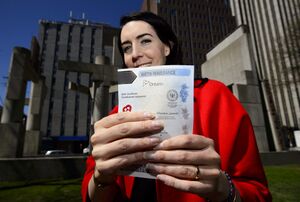Recognition (Canada): Difference between revisions
Tag: 2017 source edit |
No edit summary Tag: 2017 source edit |
||
| Line 22: | Line 22: | ||
| [[Recognition_(Canada)/bc|British Columbia]] | | [[Recognition_(Canada)/bc|British Columbia]] | ||
| style="background-color:#6cc;" | British Columbia allows X as a gender marker on the majority of drivers licenses and on birth certificates. <ref>https://news.gov.bc.ca/releases/2018HLTH0079-002116</ref> | | style="background-color:#6cc;" | British Columbia allows X as a gender marker on the majority of drivers licenses and on birth certificates. <ref>https://news.gov.bc.ca/releases/2018HLTH0079-002116</ref> | ||
| style="background-color:# | | style="background-color:#cc8;" | As on January 2022, changing gender designation does not require a physician letter expect for people under 12 years old <ref>https://www2.gov.bc.ca/gov/content/life-events/birth-adoption/births/birth-certificates/change-of-gender-designation-on-birth-certificates</ref> | ||
|- | |- | ||
| [[Recognition_(Canada)/ab|Alberta]] | | [[Recognition_(Canada)/ab|Alberta]] | ||
Revision as of 07:49, 4 July 2023
| |
The contents of this page are outdated. You can help the Nonbinary Wiki by finding up-to-date information and completing it! Note to editors: remember to always support the information you proved with external references! |

Recognition (Canada). This is a multi page section that gives information on recognition of nonbinary gender identities in Canadian services and government. In Canada, passports and immigration documents are issued federally by the Canadian government while driver's licenses, health cards, and birth certificates are issued by the appropriate provincial government.
Recognition in federal government
In 2017, the Canadian government passed bill C-16, which added "gender identity" and "gender expression" as prohibited grounds for discrimination [1]. Following C-16 the government put interim measures in place before they could issue documents without "M" or "F" [2]. As of June 2019, the Canadian government has begun issuing immigration documents (including passports) with "X" in the sex field [3].
Recognition in provincial governments
The recognition of nonbinary people by provincial governments varies across Canada. All provinces and territories have removed requirements for surgery, but many still do rely on a medical model of transness. At this point only Alberta and Ontario have moved away from the medical model for all applicants, removing the requirement for a letter from a medical practitioner. That being said some provinces have removed have also removed this requirement, but only for those over a certain age.
Every province and territory has added explicit protections for "gender identity" in their human rights legislation. The majority of provinces protect "gender expression" as well.
- Blue(#9FF) means it's friendly to nonbinary people.
- Yellow(#FFB) means it's somewhat friendly to nonbinary people.
- Red(#F99) means it's not friendly at all to nonbinary people.
| Province | Allows X on documents? | Legal gender change requirements |
|---|---|---|
| British Columbia | British Columbia allows X as a gender marker on the majority of drivers licenses and on birth certificates. [4] | As on January 2022, changing gender designation does not require a physician letter expect for people under 12 years old [5] |
| Alberta | Alberta allows X as a gender marker on birth certificates and drivers licenses. [6] | Alberta does not have any medical requirements for changing gender. [7] |
| Saskatchewan | Saskatchewan does not allow an X gender marker, but can issue a birth certificate with the gender marker hidden.[8] | Requires a letter from a physician stating that the "change of sex designation on your birth registration is appropriate"[8] |
| Manitoba |
|
No supporting documentation or fee is needed for ID cards/driver licenses.[10] Fees and documentation are required for changing the marker on a birth certificate. (No surgical requirement.)[9] |
| Ontario | Ontario allows "X", "F", and "M" markers on birth certificates and ID. [11] | No supporting documentation is required. [12] |
| Québec | Allows "X" gender markers since June 17, 2022 on birth certificates. However, it is still unrecognized by all ID-issuing government ministries. [13] | For minors, a letter from a health care professional is required. [13] |
| New Brunswick | Allows "X" gender markers on birth registration and ID since 2019. [14] | A letter from a healthcare professional is required. [15] |
| Nova Scotia | Allows "M", "F", and "X" markers.[16][17] | |
| Prince Edward Island | Allows "M", "F", "X", or blank on driver's licenses. Unclear what is offered on birth certificates. [18] | A letter from a healthcare professional is required to change a birth certificate. [19] |
| Newfoundland and Labrador | Allows "M" and "F", "X" on birth certificates. [20] | If under 16, a letter from a healthcare professional is required to change a birth certificate. If under 12, two letters are required. [21] |
| Yukon | Appears to only allow only "M" and "F" despite commitments to add "X" in 2018 [22] | If under 16, a letter from a medical practitioner or teacher is required. [23] |
| Northwest Territories | Allows "M", "F", and "X" on birth certificates. [24] | If under 19, a letter from a medical practitioner is required. [25] |
| Nunavut | M or F [26] | Requires two letters from medical practitioners to change a birth certificate. [26] |
Recognition by businesses and services
See also
References
- ↑ http://www.parl.ca/LegisInfo/BillDetails.aspx?billId=8269852&Language=E&Mode=1
- ↑ https://www.canada.ca/en/immigration-refugees-citizenship/news/2017/08/new_x_gender_designationcomingtoirccdocuments.html
- ↑ https://www.canada.ca/en/immigration-refugees-citizenship/news/notices/gender-x-documents.html
- ↑ https://news.gov.bc.ca/releases/2018HLTH0079-002116
- ↑ https://www2.gov.bc.ca/gov/content/life-events/birth-adoption/births/birth-certificates/change-of-gender-designation-on-birth-certificates
- ↑ https://www.alberta.ca/update-driving-documents.aspx
- ↑ https://www.alberta.ca/birth-record-sex-amendment.aspx
- ↑ 8.0 8.1 https://www.ehealthsask.ca/residents/Pages/Sex-Designation.aspx
- ↑ 9.0 9.1 "Change of Sex Designation". Province of Manitoba - Manitoba Vital Statistics Agency. Retrieved 23 October 2020.
- ↑ 10.0 10.1 Thompson, Sam (13 October 2020). "Non-binary, no gender identifier options now available on Manitoba IDs: MPI". CJOB. Retrieved 23 October 2020.
- ↑ https://www.ontario.ca/page/consultation-gender-and-sex-information-government-ids-and-forms
- ↑ https://www.ontario.ca/page/consultation-gender-and-sex-information-government-ids-and-forms#section-1
- ↑ 13.0 13.1 http://www.etatcivil.gouv.qc.ca/en/change-sexe.html
- ↑ https://globalnews.ca/news/4006720/nb-transgender-designation-form/
- ↑ https://www2.gnb.ca/content/gnb/en/services/services_renderer.201445.Change_of_Sex_Designation.html
- ↑ https://beta.novascotia.ca/sites/default/files/documents/2-573/change-sex-designation-16-years-age-or-older-en.pdf
- ↑ https://beta.novascotia.ca/sites/default/files/documents/2-590/change-sex-designation-15-years-age-or-younger-en.pdf
- ↑ https://www.princeedwardisland.ca/en/news/improving-diversity-and-inclusion-drivers-licences
- ↑ https://www.princeedwardisland.ca/en/information/health-pei/transgender-health-services
- ↑ https://www.cbc.ca/news/canada/newfoundland-labrador/gemma-hickey-secures-gender-neutral-birth-certificate-1.4448562
- ↑ https://www.servicenl.gov.nl.ca/birth/changing_your_sex_designation/index.html
- ↑ http://www.gov.yk.ca/forms/forms/6000/yg6471_e.pdf
- ↑ http://www.gov.yk.ca/forms/forms/6000/yg6470_e.pdf
- ↑ https://www.gov.nt.ca/newsroom/news/news-release-gnwt-introduces-changes-vital-statistics-act
- ↑ https://www.hss.gov.nt.ca/en/services/changing-your-sex-designation
- ↑ 26.0 26.1 https://www.nunavutlegislation.ca/en/download/file/fid/11258
